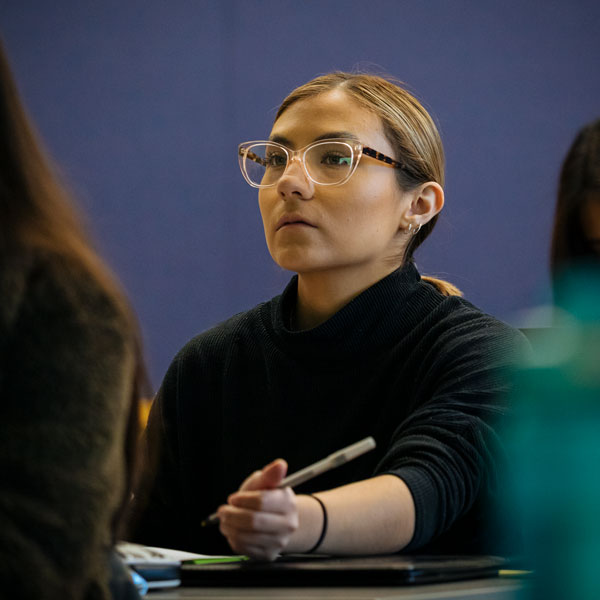This website uses cookies. Find out more in our Privacy Policy.
Public health identifies and addresses social, behavioral and environmental factors that impact our health. Learn how to prevent disease and promote mental, physical, and social health for all.
Public Health is one of the largest and fastest growing majors at Agnes Scott. Our graduates are prepared for careers at non-profit organizations, government agencies and research institutions, as well as for success in Masters of Public Health programs.
The Public Health Major and Minor at Agnes Scott introduce students to the core sub-disciplines of public health, while helping them develop essential research, program development, data analysis, and communication skills used in applied public health work. Because public health is a highly interdisciplinary field, electives for the major and minor include courses from 15 other departments, including Biology, Chemistry, Anthropology, History, Economics, Psychology, and many others. Our curriculum emphasizes the important role that social justice plays in creating healthy physical and social environments. Many in the public health and medical communities refer to Atlanta as the public health capital of the world. Agnes Scott’s Public Health students have opportunities to engage in faculty-led research, volunteer experiences and internships at a wide variety of Atlanta-based organizations including the CDC, CARE, the IRC, the Georgia Department of Public Health, The Carter Center, The Task Force for Global Health, the Center for Black Women’s Wellness, and many others.

The Public Health major prepares students for graduate study in public health and for employment in public health organizations and agencies. Students learn to recognize the impact of public health in their everyday lives, and about the ways that biological, behavioral, social, economic, and political factors interact to influence our health. Students also learn to apply this knowledge to develop potential solutions to address current public health issues. The curriculum emphasizes the development of applied skills, including data analysis, infographic design, intervention planning, program evaluation and grant writing. You'll learn to:
Agnes Scott's location in metropolitan Atlanta makes it an ideal place to explore the vast field of public health. Students participate in a number of funded internship programs, including several sponsored by the college and others sponsored by local non-profit organizations and government agencies. Additionally, students participate in research with faculty members in the Public Health Department and in other departments at the college. The Bevier Summer Internship Program is a competitive Public Health internship program for Public Health majors and minors at Agnes Scott College that provides a stipend and housing for an 8-week internship during the summer. The students earn academic credit for the internship. Students complete a substantive project, independently or with a team. Past Bevier Interns have worked at a variety of government agencies and non-profit organizations including the CDC, Georgia WAND, the Georgia Department of Public Health, Global Dialogues, The Task Force for Global Health and The Clarkston Community Center, to name just a few.
Rollins School of Public Health is the nationally ranked public health school of Emory University and is closely connected with the Atlanta-based Centers for Disease Control and Prevention (CDC). Agnes Scott and Rollins School of Public Health have a concurrent enrollment program with Emory University's Rollins School of Public Health. Eligible students who major or minor in public health can take graduate-level courses at Rollins for no additional cost. These courses count toward the undergraduate degree at Agnes Scott, and students who are accepted to Rollins’ M.P.H. program can also count those courses toward their graduate degree.
In 2014, Agnes Scott College organized the first annual Atlanta Undergraduate Health and Society Conference, and participation in the conference has grown consistently every year since. Undergraduate students from Atlanta-area schools present their health-related research and internship experiences. Keynote speakers for the conference have included: Dr. Camara P. Jones (Senior Fellow at the Morehouse School of Medicine Satcher Health Leadership Institute and Cardiovascular Research Institute, Former President of the American Public Health Association), Dr. Leandris Liburd (Director of CDC's Office of Minority Health and Health Equity), and Dr. Elizabeth Ford (Director of the DeKalb County Board of Health).
There are hundreds of diverse careers in the field of public health. Public health professionals work in local, state, and government agencies, as well as in local, national, and global non-profits, corporations, consulting agencies, hospitals, think tanks, and universities.
Public Health is a multidisciplinary field with a diverse range of job opportunities. Public Health experts work for hospitals, large government organizations like the Centers for Disease Control and Prevention, state health departments, large and small non-profits and community organizations, city governments, private companies and foundations, and global health and development organizations, among others. Their job titles include: health administrator, health scientist, behavioral scientist, health educator, epidemiologist, biostatistician, public health nurse, environmental health scientist, policy writer, biologist, anthropologist and many more.